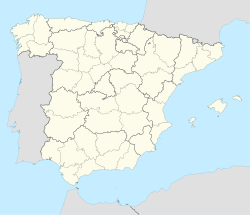Nogarejas, also Nogarejas de la Valdería. Village in the municipality of Castrocontrigo, in the South-West area of the Province of León, Spain. The road LE-125 (La Bañeza to Puebla de Sanabria) drives to Nogarejas, and also the LE-133, getting there from the South and the village of Rionegro del Puente (Zamora, Spain). The river Codes crosses the village from the North-West, just before flowing into the River Eria, which gives its name to the whole region (Valderia: Val d’Eria or Eria Valley).
Nogarejas, Spain | |
|---|---|
 Panoramic view of Nogarejas, from the South | |
| Coordinates: 42°11′22″N 6°08′20″W / 42.18944°N 6.13889°W | |
| Country | Spain |
| Autonomous community | Castile and León |
| Province | León |
| Municipality | Castrocontrigo |
| Elevation | 920 m (3,020 ft) |
| Population (2011) | |
| • Total | 286 |
| Time zone | UTC+1 (CET) |
| • Summer (DST) | UTC+2 (CEST) |
| Postal Code | 24734 |
| Telephone prefix | 987 |
In the year 2009 it counted 298 inhabitants.[1]
Origins
editThe findings of tégulas allow to assert that in the place there were Roman settlements. And the existence of the village of Nogarejas is documented from, at least, 1159.[2]
In June 1199, there is a “litterae executoria” of Pope Innocent III in relation to a claim on the payment of tithes between the Bishop of Astorga and the monastery of San Esteban de Nogales.[3]
It seems that, for many centuries, a few shepherds from the nearby village of San Esteban de Nogales, travelled to the Eria River and streams that converge in search of pastures for their livestock, during the summer. The prairies so occupied were called “Nogalejas” because of their origin of (San Esteban de) Nogales.[4]
And, according to Paramio, toponymic evidence suggests that the inhabitants of San Esteban de Nogales had to do with the founding of the town, whose name would be evolving from “Nogarelas” to “Nogareyas” and finally “Nogarexas”, before the current Nogarejas.[2]
According to Vicenta Fernandez Marcos the voice of Nogarejas is a derivative of “nogal“, whose diminutive suffix, which has a derogatory value, comes from the Latin - ecula. This voice is credited the meaning of walnut.[5]
The Modern Age has been especially useful to provide information on the history of Nogarejas, whose economy was farming, was organized politically through councils, with mayors at front, and fought their independence at that time from the Corregidor of Castrocalbón.[2]
Local Economy
editThe lands of Nogarejas belonged to the House of Alba y Aliste, even after the abolition of Lordships.[2] Already in the 20th century the economy was based on the resin exploitation of its pine forests, reaching two resin factories in production simultaneously.[2] Currently both factories are closed.
Gallery
edit-
The Cross
-
La Ermita
-
River Codes
-
River Eria
References
edit- ^ "Caja España, datos económicos y sociales 2009" (PDF). Ficha Municipal de Castrocontrigo, pág. 12. Archived from the original (pdf) on 17 December 2009. Retrieved 5 March 2011.
- ^ a b c d e Paramio Teruelo, Jose Miguel (2009). Historia de Nogarejas. Leon: Lobo Sapiens. ISBN 978-84-92438-19-8.
- ^ "official web of the Junta Vecinal de Nogarejas". Historia de Nogarejas. Archived from the original on 6 June 2011. Retrieved 27 February 2011.
- ^ "Castillospedia". Castillo de Nogarejas, toponimia. Retrieved 27 February 2011.[permanent dead link]
- ^ Fernández Marcos, Vicenta (1990). Los Vegetales en la Toponimia Leonesa. Tierras de León (in Spanish). Vol. XXX. pp. 79–80.


